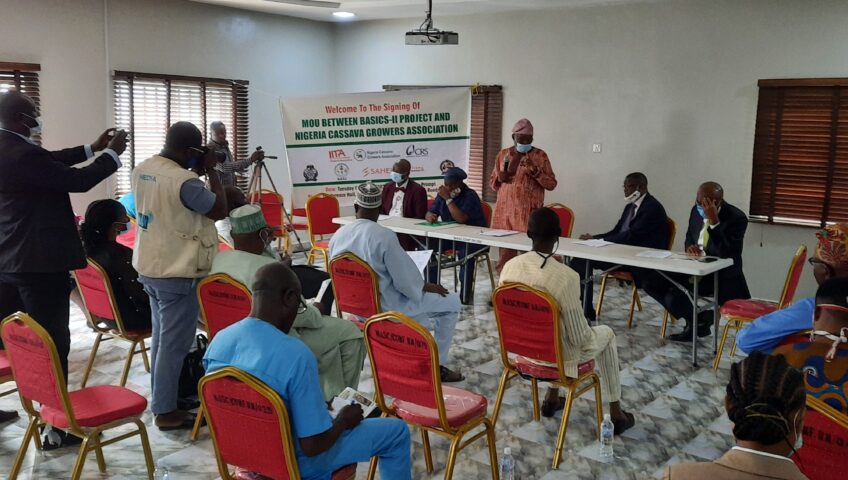The International Institute of Tropical Agriculture (IITA) has signed a Memorandum of Understanding (MoU) with the Nigeria Cassava Growers Association (NCGA) to advance the development of the cassava seed sector.
The MoU which was developed in the framework of the Building an Economically Sustainable, Integrated Cassava Seeds System, Phase 2 (BASICS-II), will give Nigerian cassava growers access to improved, clean and disease-free cassava varieties. IITA will backstop the growers on technologies such as the Six Steps to Cassava Weed Management and Best Planting practices that was developed by the IITA-managed Cassava Weed Management Project and the African Cassava Agronomy Initiative (ACAI).
During the signing of the MoU, the Director-General of IITA, Dr Nteranya Sanginga, said that the project will midwife a new role for cassava seed producers and root farmers in Nigeria.
Represented by Dr Gbassey Tarawali, officer in charge of IITA Abuja, Dr Sanginga said that the project would provide another opportunity for Nigeria to develop a commercially sustainable model for cassava seed system in the country.
“We are sealing an alliance by all actors to ensure facilitation and supply of quality certified and disease-free seeds to farmers to help Nigerian smallholders improve their productivity and family income.
“Our model will increase not only farmers’ income but also roots for processors and the industries that will in turn contribute to the socio-economic development of our communities,’’ Dr Sanginga said on October 6.
Reacting, the President of NCGA, Pastor Segun Adewumi, said the MoU would enable the availability and accessibility of various improved varieties of cassava, ensure higher yields and enhance the quality of products.
“We are really excited as we look forward to the cassava revolution that will enable our cassava industrial derivatives compete favorably in the domestic and international market,’’ Pastor Adewumi said.
The Director General of the National Agricultural Seed Council (NASC), Dr Philip Ojo, said the signing of the MoU was a move in the right direction.
He pledged that NASC would provide the enabling framework to ensure effective regulation and certification of improved disease-free cassava varieties so that farmers can get the benefits of improved stems.
The Project Manager of BASICS-II, Prof Lateef Sanni explained that the vision is to have a commercially sustainable model for cassava seed system that can be replicated in other parts of Africa.
“The value chain should improve access to improved cassava stems and create jobs for women and young people,” he added.

